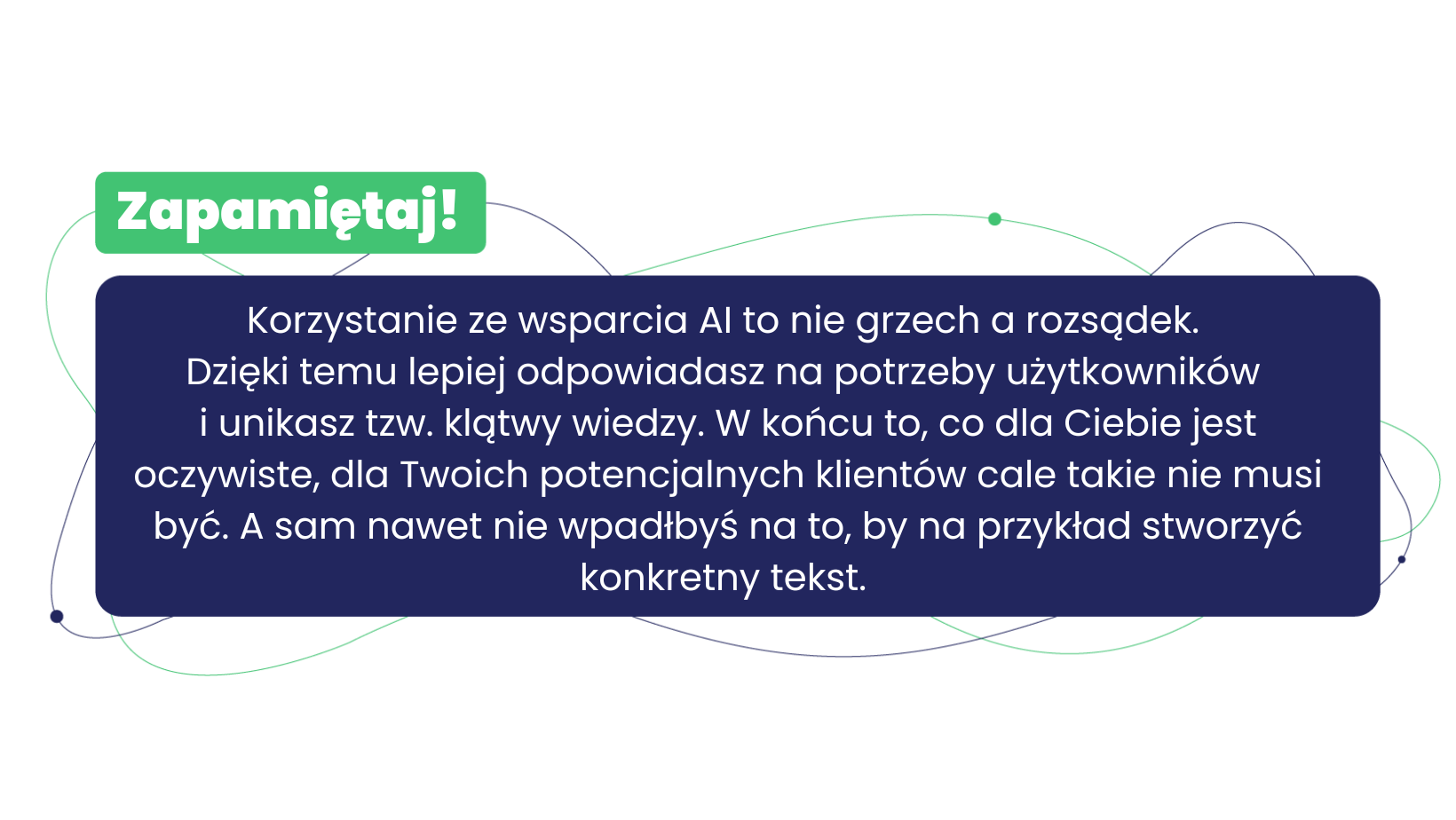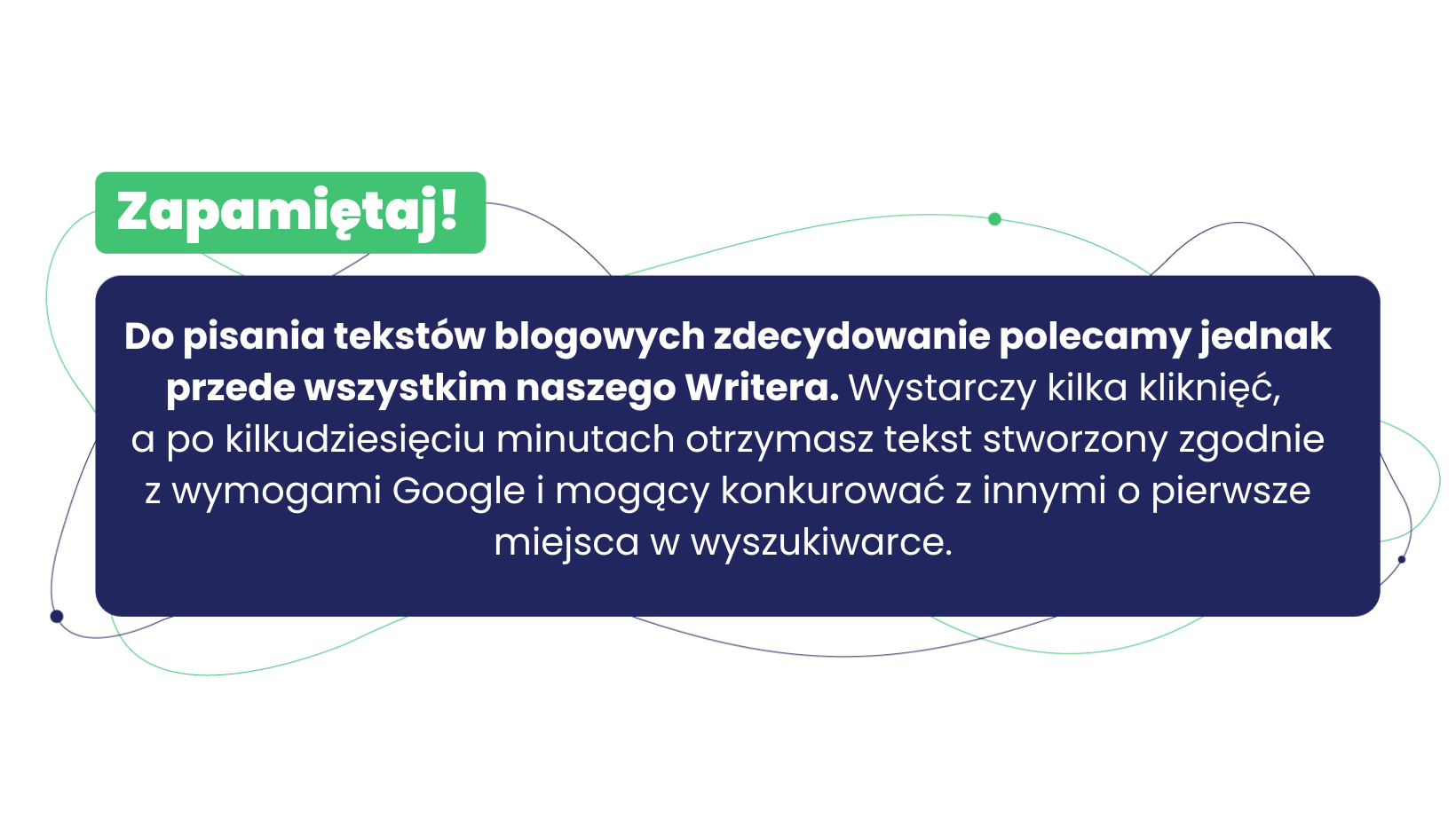Artificial intelligence is revolutionizing the digital marketing market. AI offers tools and solutions that seemed impossible just a few years ago. Recent months even resemble a technological revolution. And yes – artificial intelligence has been with us for many years, but now it is gaining real acceleration. The opportunities it presents can definitely give your business a boost. So see how to use AI in online marketing!.
Many people, when they hear the term “artificial intelligence, think of advanced robots or systems that have human consciousness and feel real emotions. We know this from literature, fairy tales and fables. Just think of the Jetsons or the movie “Her.” But let’s agree – such a vision is still a melody of the future..

Although, thanks to machine learning, a variety of tools are already achieving the ability to perform such tasks that, if performed by a human, would require just intelligence. These include, for example:.
-
- understanding,
.
-
- learning,
.
-
- pattern recognition,
.
-
- language interaction,
.
- problem-solving.
The skills that artificial intelligence is trained to do mean that it can not only significantly speed up the work of marketers, but also suggest solutions that they themselves might have overlooked. So let’s take a look at what areas can AI appear in marketing? .
Examples of using AI in online marketing
.
Market research analysis
.
Modern marketing is not only about creating compelling advertising campaigns, but also about effectively using available data to better understand consumer needs and behavior. In this role, artificial intelligence excels as a tool for analyzing huge collections and drawing accurate conclusions. .
All you have to do is throw in the collected data, and AI will do all the analysis based on that:.
-
- identify patterns,
.
-
- name trends,
.
-
- determine consumer preferences,
.
- find potential gaps in the marketplace.
And all of this your brand can use in business or communications. Market researchhas never been easier. 😉
Use AI during market research to:.
-
- find patterns of behavior
.
- idetify trends
- determination of consumer preferences
- identify potential gaps in the market
The key to success here is automation, whereby machine learning-based algorithms find patterns that are difficult to identify even for a seasoned analyst. Historical data, such as purchase behavior, preferences, browsing history or online brand interaction, helps AI to advance customer segmentation.This allows companies to target exactly the market segments that are most valuable to them.In turn, consumers receive offers tailored to their individual preferences, making them more likely to make a purchase..
Analysis of competition
.
Artificial intelligence not only helps to better understand consumer expectations and behavior, but is also useful in analyzing the doings of competitors. Instead of manually typing the names of competing companies into an Internet search engine, you can put the collection of data about them into the virtual hands of AI..
Artificial intelligence algorithms can track competitors’ activities in real time – from website updates to social media posts to changes in product mix or pricing.
Artificial intelligence will also tell you where your competitors’ potential Achilles’ heels are and how those brands are perceived by their environment. All this will make you better able to tailor your marketing efforts to a rapidly changing market. .
Read also: competitor analysis – how to gain an edge in the marketplace?.
Ggraphics/infographics generation
.
AI in online marketing is not only to support the development of an action plan, but also its execution. There are a number of AI-powered tools that can create content for you – both written and visual – and optimize it to be more effective and ultimately lead to conversions. .
Already AI is automating the processes involved in creating graphics and infographics that visualize complex information in an accessible way. However, in order for the graphics to meet your expectations, it is essential to create the right prompts, or commands, for artificial intelligence.
Tools such as DALL-E or Midjourney can really do a lot for the visual side of your business. Just give them the right output and formulate your expectations for the result in detail. Also, Canva or Microsoft Design provide opportunities for graphic designers to work with artificial intelligence..
The result? You achieve really attractive designs for relatively little money!.
These are examples of graphics tools using AI:.
-
- DALL-E
.
- Midjourney
- Canva
- Microsoft Design
Inkeyword/topic search
.
Algorithms based on AI analyze content and web searches to identify the most important keywords and topics that are currently popular with users. This allows brands to create content that aligns with both audience expectations and search engine requirements. This, in turn, will clearly support your SEO efforts. .
Hints from AI tools, such as ChatGPT created by OpenAI, or Answer The Public relieve marketers of their daily work. This way, you don’t always have to come up with more and more topics in the same area on your own. Artificial intelligence will surprise you with its suggestions. All thanks to the analysis of your audience’s needs and behavior. .
Marketers often succumb to the curse of knowledge, making them think that some topics are not worth covering, because everyone already knows everything in that area. Meanwhile, it may turn out that your audience needs clarification of basic issues in your industry, or development of a particular thread, and thanks to the aforementioned AI-based tools, you will know about it. .
This is also why Senuto Writertakes advantage of the benefits of AI and supports you in:.
-
- select the right key phrases,
.
-
- generating meta tags,
.
-
- creating text structure,
.
- writing entire guide texts.
It is also important to find out what your potential audience calls certain phenomena. The issue of semantics is very important when choosing the keywords or topics you want to write about. Here again, artificial intelligence can come to your aid. .

Content Generation
.
Artificial intelligence is also capable of creating content itself – from articles to product descriptions. While it won’t fully replace the human creator, it can significantly speed up and facilitate the writing process. The aforementioned ChatGPT or JasperAI are tools that will allow you to create content such as mailing content, product descriptions, blog posts and much more. .
Clear – these are not perfect tools, but they will still reduce your work time by up to tens of percent. This will work well, for example, when you need to create the same content multiple times, but to different audiences. The process of personalization, adjusting the style of communication or support in generating mailings to different audiences has never been so easy.Algorithms based on artificial intelligence can tailor content to individual audience preferences, which guarantees more personalized and engaging messages.

The AI writer is also able to analyze existing materials and suggest key modifications, such as:.
-
- adding relevant keywords,
.
-
- corrections in text structure,
.
- automatically generate creative headlines.
This all increases the attractiveness of your texts for readers. The quality of the created content also increases thanks to the ability to automatically correct grammatical and stylistic errors. .
Remember, however, that artificial intelligence is worth saying “check” to. This is because they are trained to give an answer to the question asked, even when… they don’t know it. They end up coming up with false data and information. From here, we warmly greet ChatGPT..
E-mail campaigns (outreach)
.
E-mail marketing automation and personalization tools have been known and implemented for years. However, artificial intelligence offers entirely new possibilities in creating relationships with potential customers, partners or influencers. Unlike traditional email marketing methods, where recipients themselves sign up for a mailing list, in an outreach strategy it is the marketers who actively seek out and make contact with potential stakeholders. Unfortunately, very often their actions can be perceived as SPAM, which is why it is so important to make the first contact in a skillful way. The key here, as in many other areas of online marketing, is personalization. And with this, as is already known, artificial intelligence is doing great. So AI can support outreach efforts with more personalized and tailored content for specific audiences..
What’s more, AI algorithms can predict which messages will bring the greatest response among specific audience segments, enabling them to focus on the most effective activities. Using analysis of trends and preferences of online audiences, artificial intelligence can also suggest the most attractive topics or the way to present them in communications. AI’s collaboration with other marketing tools, including all in one CRM software, allows you to optimize your outreach strategy, tailoring it to your needs at different stages of the sales funnel.
Additionally, thanks to AI, it is possible to analyze the factors that lead users to classify messages as SPAM, allowing you to modify messages to reduce the risk of rejection by recipients..
.
Uff… A lot of these examples behind us. It might even seem that I have long since simply exhausted the topic. BUT NO! there are still many areas where AI can help you. After all, another important point of the marketer-AI relationship is, of course, social media. .
Let’s not kid ourselves. The amount of content that now appears every day on social media makes it hard to break through to your audience’s consciousness. Your brand is competing every day with photos, videos and texts from family, friends, influencers and other companies. However, with artificial intelligence, you can increase your chances of social media visibility. .
How .
Through AI you can, for example:.
-
- analyze user reactions,
.
-
- predict trends,
.
- tailor content to individual audience preferences.
All thanks to the aforementioned skills, such as data analysis and prediction. It still doesn’t stop there. 🙂
AI algorithms will also help optimize ads, such as matching the budget and content of social media ads to the right segment in real time to maximize ROAS. In turn, with image recognition technologies, brands can analyze photos and videos posted on social media to understand the context in which their products or services are presented, and even monitor the use of their logos on social media.
Sounds good, doesn’t it? .
Today, however, the easiest places to encounter AI are where brands interact directly with users. AI-based chatbots conduct conversations with users on social media platforms, answering questions, providing information or assisting in the purchasing process. .
SAI-based systems can also automatically respond to comments or feedback on social media, providing quick response and community engagement.
Summary
.
Artificial intelligence (AI) offers many tools to support brands in more effectively realizing the potential of digital marketing.Through AI, communications become more personalized, effective and automated, and brands are better equipped to respond to the needs and expectations of their community. However, it is important to keep in mind ethics and transparency in the use of these technologies. And also not to rely fully on artificial intelligence alone. After all, before this one came along, we were able to run effective campaigns, too. .
What are the applications of AI in marketing?
.
You will use artificial intelligence in marketing in many ways. First of all, to automate basic processes. With the right tools and prompts, you can speed up the execution of market research, competitive analysis, content creation and optimization or customer service. .
What to do to use AI in marketing?
.
To use artificial intelligence in marketing you need, first of all, to understand how it works. This will help you search for the right tools that, thanks to machine learning, mimic the work of humans and take over repetitive, tedious tasks from you. .
 Iza Sykut
Iza Sykut